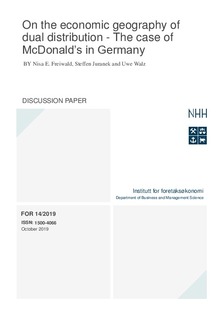On the economic geography of dual distribution - The case of McDonald’s in Germany
| dc.contributor.author | Freiwald, Nisa E. | |
| dc.contributor.author | Juranek, Steffen | |
| dc.contributor.author | Walz, Uwe | |
| dc.date.accessioned | 2019-10-30T11:36:11Z | |
| dc.date.available | 2019-10-30T11:36:11Z | |
| dc.date.issued | 2019-10-29 | |
| dc.identifier.issn | 1500-4066 | |
| dc.identifier.uri | http://hdl.handle.net/11250/2625369 | |
| dc.description.abstract | We analyze the allocation of ownership in a franchise system by focusing on location-specific characteristics of the outlets. This study uses a comprehensive data set on McDonald’s restaurants in Germany to investigate the drivers of the decision on whether outlets are companyowned or franchised. We find strong evidence for the repeat-customer hypothesis by showing that outlets are significantly more likely to be company-owned when they are located at places with relatively few repeat customers.We observe the same for outlets that are closer to McDonald’s headquarters. Finally, we find pronounced clustering of multi-unit franchisees. | nb_NO |
| dc.language.iso | eng | nb_NO |
| dc.publisher | FOR | nb_NO |
| dc.relation.ispartofseries | Discussion paper;14/19 | |
| dc.subject | Franchising | nb_NO |
| dc.subject | dual distribution | nb_NO |
| dc.subject | agency theory | nb_NO |
| dc.subject | geo-locational data | nb_NO |
| dc.subject | economic geography | nb_NO |
| dc.title | On the economic geography of dual distribution - The case of McDonald’s in Germany | nb_NO |
| dc.type | Working paper | nb_NO |
| dc.source.pagenumber | 12 | nb_NO |
Tilhørende fil(er)
Denne innførselen finnes i følgende samling(er)
-
Discussion papers (FOR) [564]
